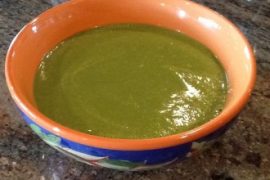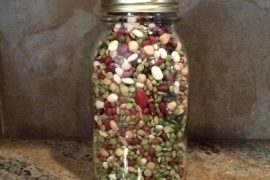Souper Meal
If you’re looking for a nutritious meal, you can’t beat soup. Most soups contain a protein source and are packed with vegetables; thus, they tend to be incredibly nutrient-dense. They often contain aromatic herbs, such as oregano, rosemary, sage, and thyme, which are antioxidants (meaning they help prevent the damaging effects of oxidation on cells). Many soups also contain spices, such as ginger and turmeric, which have anti-inflammatory properties. Furthermore, soup is usually cooked for a long time with oil, which makes it easy for our bodies to digest and assimilate the fat- and water-soluble nutrients it contains.
Soup’s not only nutritious; studies suggest it’s also more satiating than most meals. Normally when you drink water, it passes straight from the stomach to the intestines. But when you eat foods with high water content, such as soup, the water stays in the stomach and makes you feel fuller longer.1 In one study, participants who ate soup reported feeling full for an hour and a half longer than participants who ate solid food.2
Homemade Health
Canned soup makes a fast and tasty meal, but it may not be as healthy as soup made at home from scratch. Food manufacturers use sodium as a preservative and flavor enhancer, so many soups are packed with it. (As with many nutrition topics, the jury’s still out on the long-term health effects of a high-sodium diet.4
Furthermore, many soup cans are lined with the synthetic estrogen compound bisphenol A (BPA), which can leach into soup. In one study, people who consumed a serving of canned soup a day for five days had a 1,221 percent increase in urinary BPA over people who consumed freshly made soup for five days.7 (BPA has been linked to many health issues, including cancer and heart problems.8) Before you purchase canned soup, check the Environmental Working Group database to find out which brands use BPA-free cans.9 Peruse labels, and look for a soup that’s nutritious and free of any additives you want to avoid.
Making Soup a Snap
Homemade soup made from fresh ingredients is undoubtedly healthiest, and it’s also one of the easiest foods to make. Start by making a flavorful, nutritious stock. It’s easy to prepare, and it makes the perfect base for any soup. Then experiment with different soup recipes or build your own soup with ingredients you have on hand.
Soup takes a while to prepare, but it freezes well, and it usually tastes better after a day or two. Make a pot on the weekend and stick a couple of jars in the fridge and a couple in the freezer. You’ll be set for an entire week of breakfasts, and all you’ll have to do in the morning is reheat and serve.
Soup combines the best aspects of slow and fast food. If you usually eat breakfast on the run, invest in some insulated storage containers and you can take it with you.
Soup’s On!
Soup for breakfast may sound strange, but it’s already catching on in some parts of North America. People line up in New York to get steaming hot to-go cups of bone broth for breakfast at several restaurants.10 That’s great news because it’s time to welcome soup to the breakfast table. A satiating, nutrient-dense, easy-to-digest meal is the perfect way to start the day. And soup isn’t just for cold weather. Chilled soups, such as gazpacho and cucumber soup, are nutritious and refreshing on a summer morning.
Looking to try a few new soup recipes? Here are a few to get you started:
Ann Wigmore Energy Soup
Butternut Squash Soup
Kale, White Bean & Sausage Soup
Red Chard, Lentil & Veggie Soup
Spinach, Fennel & Pea Soup








